11 Best Probiotic Yogurts Recommended by a Nutritionist
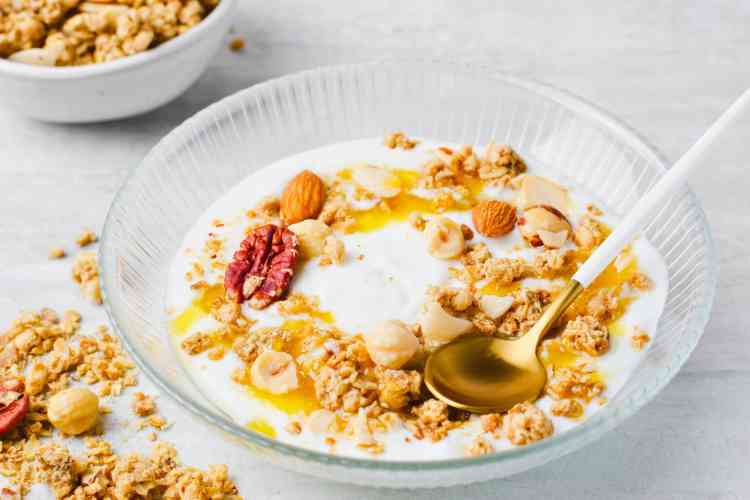
Choosing the best probiotic yogurt need not be overly complicated, but you need to understand this nutrient-dense food’s role in your overall health. According to Harvard Health, “If you want a healthy gut, you have to feed it well.” In practical terms, that means prioritizing foods that supply both prebiotics and probiotics.
This is where yogurt can fit into a balanced diet. Combining essential nutrients with tasty flavors, the best probiotic yogurts offer more than just a creamy snack — they supply a mix of protein, vitamins, calcium and live bacteria. These gut-friendly probiotics are trending for good reason, as some yogurts with specific probiotic strains may help support digestive comfort and regularity for some people.
You may be wondering, then, what is the best probiotic yogurt? And how do you know which one to choose? When it comes to the best yogurt for probiotics, not all brands contain the same types of live cultures, and not all labels clearly explain what’s inside.
Luckily, we’re here to help you make the right choice with this guide to the 11 best probiotic yogurts, all recommended by a nutritionist.
Jump to Section
- The 11 Best Probiotic Yogurt Brands
- What Is the Best Probiotic Yogurt?
- How To Tell if a Yogurt Has Probiotics
- Does All Yogurt Have Probiotics?
- How We Choose the Best Probiotic Yogurts
The 11 Best Probiotic Yogurt Brands
1. Activia
Activia makes some of the best probiotic yogurt and is virtually synonymous with “yogurt that is good for you.” Available in tubs as well as in drink form, this low-calorie yogurt comes in many delicious flavors. The strawberry-flavored yogurt drink rates high among customers and is considered one of the more popular yogurts with live cultures.
The classic probiotic yogurt from Activia has a rich, sweet vanilla flavor and works well as a base for granola or fruit. For those who prefer a sweeter yogurt, Activia can be a good fit. However, it is relatively high in sugar for its size and lower in protein compared to some Greek-style options.
The packaging is convenient, with small containers that are easy to take on the go. Activia earns a place here because it is made with cultured Grade A reduced-fat milk and contains active cultures, including S. thermophilus and L. bulgaricus, along with its proprietary Bifidobacterium animalis lactis DN-173 010 strain. For some people, yogurts with specific strains may help support digestive comfort when eaten consistently as part of a balanced diet.
Activia Vanilla Probiotic Yogurt Nutritional Info (per 113-gram serving)
- Calories: 90
- Total Fat: 1.5 grams (2% DV)
- Saturated Fat: 1 gram (5% DV)
- Sodium: 55 milligrams (2% DV)
- Total Carbs: 15 grams (5% DV)
- Fiber: 0 grams
- Total Sugar: 12 grams
- Added Sugar: 8 grams (16% DV)
- Protein: 4 grams

2. Yoplait Light
Another of the best probiotic yogurts for those seeking a fat-free option is Yoplait Light. It is gluten-free and currently comes in 10 different flavors. Due to its natural sweetness, we suggest you pair this live culture yogurt with lighter toppings, such as unsweetened, healthy granola, sliced fruit or nuts, to keep overall added sugar in check.
Yoplait Light is made with cultured Grade A low-fat milk and contains just 1 gram of added sugar per serving. It also boasts live and active yogurt cultures, including beneficial probiotic bacteria. If you’re looking for one of the best probiotic yogurts that’s higher in protein, though, you’ll want to keep on scrolling, as one serving has only 5 grams of protein.
Yoplait Light Very Vanilla Nutritional Info (per 170-gram serving)
- Calories: 80
- Total Fat: 0 grams
- Saturated Fat: 0 grams
- Sodium: 75 milligrams (3% DV)
- Total Carbs: 15 grams (5% DV)
- Fiber: 0 grams
- Total Sugar: 7 grams
- Added Sugar: 1 gram (2% DV)
- Protein: 5 grams
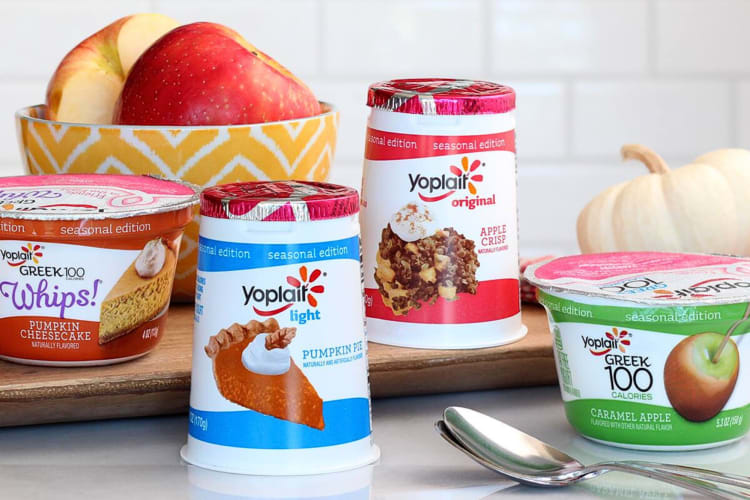
3. Siggi’s Icelandic Skyr
Skyr is a traditional yogurt from Iceland, and Siggi’s Icelandic Skyr is among the best probiotic yogurts for those seeking a high-protein option. Its thick texture comes from straining out extra whey, a process that also boosts protein content, making it one of the best high-protein yogurts in this guide.
Icelandic skyr is available in fat-free, low-fat and whole-milk varieties. Siggi’s skyr contains less lactose than regular yogurt, which may make it easier to tolerate for some people with lactose sensitivity, though it is not lactose-free.
Its rich, dense consistency works well on its own or paired with granola, nuts or fruit for one of the healthiest breakfasts in terms of protein and nutrient balance. Each serving includes five live and active cultures and delivers 15 to 16 grams of protein, depending on the flavor and fat content.
Siggi’s Plain Skyr Nutritional Info (per 150-gram serving)
- Calories: 90
- Total Fat: 0 grams
- Saturated Fat: 0 grams
- Sodium: 55 milligrams (2% DV)
- Total Carbs: 6 grams (2% DV)
- Fiber: 0 grams
- Total Sugar: 4 grams
- Added Sugar: 0 grams
- Protein: 16 grams
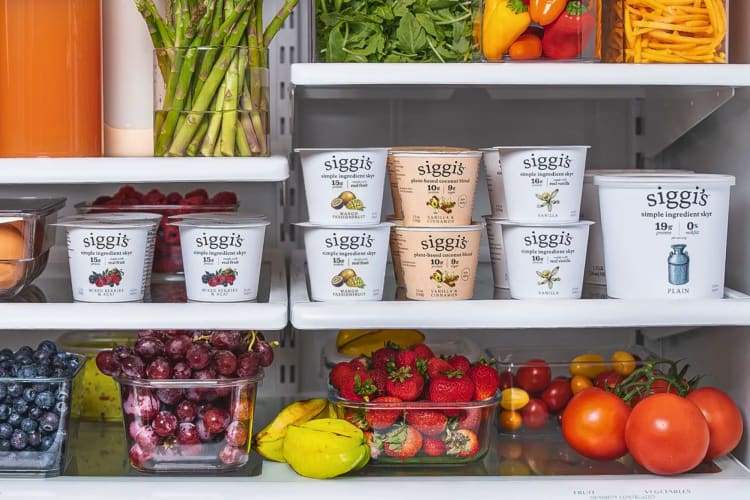
4. Chobani
Chobani is one of the best probiotic yogurts in the Greek-style category. Some varieties are enriched with fiber from chicory root, which can help increase fiber intake and may support fullness for some people. Overall, its nutrition profile is similar to Icelandic skyr, with lower lactose than regular yogurt and a solid protein content, though not as high as skyr. Chobani also stands out for its thick, tangy flavor that appeals to many yogurt fans.
There is a wide range of Chobani yogurt flavors and fat levels, making it easier to choose one that fits your preferences and dietary needs. Depending on the product line, each serving lists six live and active cultures on the label, including including several lactobacillus strains and bifidobacteria, depending on the line. These cultures contribute to the product’s probiotic profile, though amounts and specific strains may vary across varieties.
While Chobani makes some of the best probiotic yogurts in terms of taste and texture, the products are not made with organic milk. For those seeking a low-calorie, higher-protein yogurt with multiple live cultures, certain Chobani lines can be a strong option.
Chobani Zero Sugar Vanilla Nutritional Info (per 150-gram serving)
- Calories: 60
- Total Fat: 0 grams
- Saturated Fat: 0 grams
- Sodium: 65 milligrams (3% DV)
- Total Carbs: 5 grams (2% DV)
- Fiber: 0 grams
- Total Sugar: 0 grams
- Added Sugar: 0 grams
- Protein: 12 grams
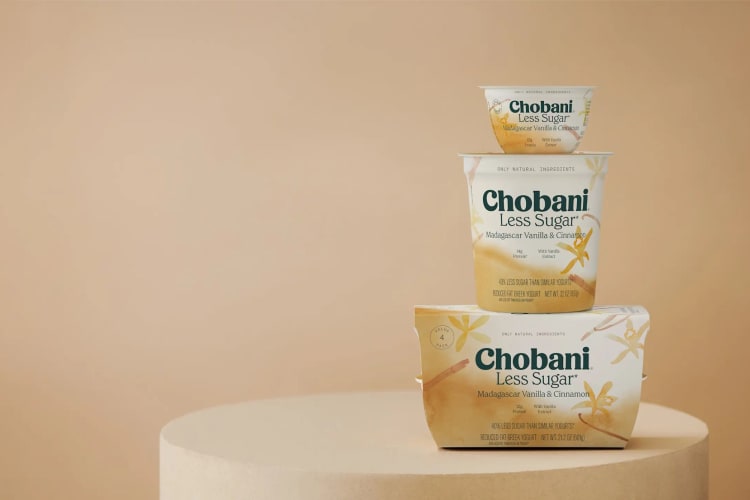
5. Stonyfield Organic
Stonyfield Organic Yogurt is one of the best probiotic yogurt options for those looking for high-protein, low-fat varieties made with certified organic ingredients. The company emphasizes sustainable farming practices and avoids the use of GMOs, antibiotics, pesticides and artificial hormones, meeting USDA Organic standards across its product line.
While sustainability is a core value for the brand, Stonyfield also offers some of the best yogurts for gut health. Many of its products contain live and active cultures, providing both protein and calcium in each serving. The exact types and amounts of probiotic cultures can vary by product, so checking the label is the best way to confirm strain details.
Flavored varieties of Stonyfield Organic Yogurt may contain added organic sugar to enhance taste. For those looking to minimize added sugar while still getting live cultures, the plain option is the best probiotic yogurt choice within the brand’s range.
Stonyfield Organic Greek Nonfat Plain Nutritional Info (per 170-gram serving)
- Calories: 90
- Total Fat: 0 grams
- Saturated Fat: 0 grams
- Sodium: 50 milligrams (2% DV)
- Total Carbs: 7 grams (3% DV)
- Fiber: 0 grams
- Total Sugar: 4 grams
- Added Sugar: 0 grams
- Protein: 16 grams

6. Fage Total
Fage (pronounced fa-yeh) originated in Greece and is well known for its authentic Greek-style yogurts. Its signature straining process removes excess whey, creating a thicker, creamier texture while increasing protein content. This makes Fage one of the best probiotic yogurts for those looking for a nutrient-dense option with live and active cultures.
Fage products are free from added sugars and sweeteners in their plain varieties, and they contain no artificial flavors or preservatives. Labels list five live cultures — L. bulgaricus, L. acidophilus, L. casei, S. thermophilus and Bifidus — all of which contribute to the yogurt’s probiotic profile, though amounts and potential benefits can vary by strain and by person.
The brand offers both nonfat and full-fat versions, with the latter often chosen as one of the best keto yogurts because of its higher fat and lower carbohydrate content. The high protein per serving can help support satiety, making it a versatile choice for meals and snacks. For younger consumers, the Fage Junior range contains 35% less sugar than many children’s yogurts, which can make it a healthy snack for kids when compared with higher-sugar options.
Fage Total 0% Nutritional Info (per 170-gram serving)
- Calories: 90
- Total Fat: 0 grams
- Saturated Fat: 0 grams
- Sodium: 65 milligrams
- Total Carbs: 5 grams (2% DV)
- Fiber: 0 grams
- Total Sugar: 5 grams
- Added Sugar: 0 grams
- Protein: 18 grams
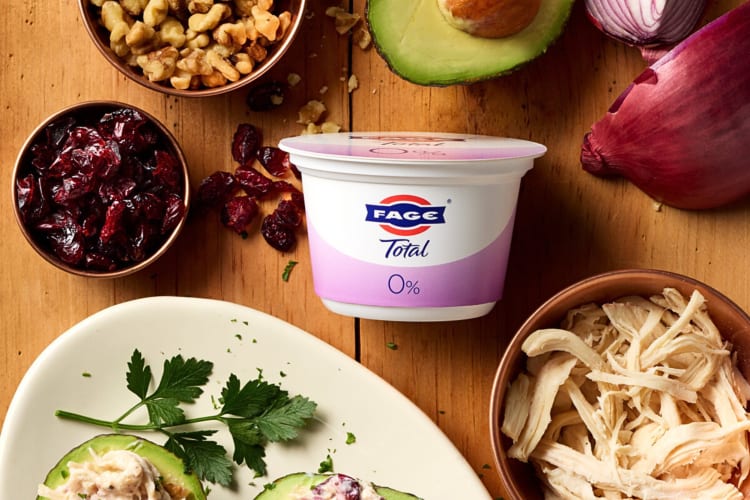
7. Maple Hill Creamery
Maple Hill Creamery is a popular choice for those looking for preservative- and additive-free dairy products. Known for producing some of the best probiotic yogurts that are certified organic, Maple Hill is a 100% grass-fed dairy company that partners with more than 130 organic farms in New York State. This approach supports sustainable farming while ensuring high-quality milk for its yogurt.
The brand’s plain Greek yogurt is free from added sugars, colors and hormones, and it contains a mix of eight live bacterial cultures, including B. lactis, L. acidophilus, L. delbrueckii subsp. bulgaricus and S. thermophilus. With 15 grams of protein per serving, its thick, creamy texture works well on its own or paired with toppings such as fresh fruit or gluten-free granola for a delicious gluten-free breakfast.
While Maple Hill ranks among the best probiotic yogurts for its ingredient quality, it is higher in calories and saturated fat than some other brands on this list. For those who want an organic option and a richer flavor profile, it can be a good fit in a balanced diet, especially if you balance saturated fat across the rest of the day.
Maple Hill Plain Greek Yogurt Nutritional Info (per 170-gram serving)
- Calories: 160
- Total Fat: 7 grams (9% DV)
- Saturated Fat: 4.5 grams (22% DV)
- Sodium: 90 milligrams (4% DV)
- Total Carbs: 9 grams (3% DV)
- Fiber: 0 grams
- Total Sugar: 5 grams
- Added Sugar: 0 grams
- Protein: 15 grams
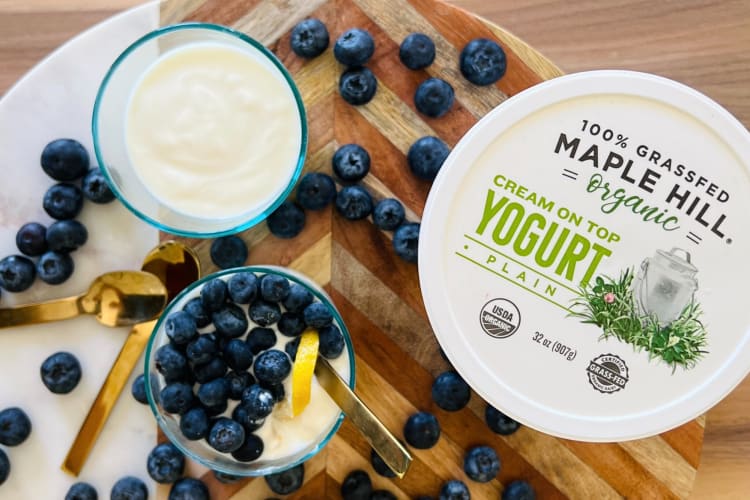
8. Wallaby Organic
Wallaby yogurt, as the name suggests, was inspired by the Australian slow-crafting process that produces a smooth, mellow flavor. This brand earns a place among the best probiotic yogurts for its use of carefully selected live cultures and USDA-certified organic milk.
The milk comes from pasture-raised cows fed a non-GMO, organic diet without antibiotics, growth hormones or synthetic pesticides. While these farming practices do not directly increase probiotic benefits, they do meet high organic and sustainability standards.
Wallaby’s whole milk plain Greek yogurt contains 15 grams of protein per serving and a mix of live and active cultures, including L. acidophilus, L. bulgaricus, S. thermophilus, L. paracasei and Bifidus. These cultures contribute to its probiotic profile, though the specific health effects can vary depending on the strain and the amount present at the end of shelf life. The yogurt’s rich, creamy texture makes it enjoyable on its own or with fruit and nuts for a balanced snack.
It is slightly higher in saturated fat than some other options, so those monitoring their intake may prefer the lower-fat varieties. For those who prioritize flavor, texture and organic sourcing, Wallaby remains one of the best probiotic yogurt choices.
Wallaby Organic Whole Milk Plain Nutritional Info (per 170-gram serving)
- Calories: 160
- Total Fat: 8 grams (10% DV)
- Saturated Fat: 5 grams (25% DV)
- Sodium: 60 milligrams (3% DV)
- Total Carbs: 8 grams (3% DV)
- Fiber: 0 grams
- Total Sugar: 5 grams
- Added Sugar: 0 grams
- Protein: 15 grams
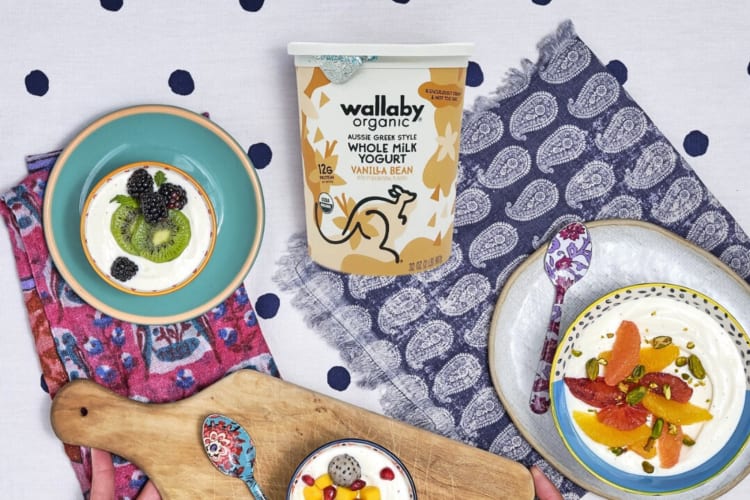
9. Noosa
Originating in Australia, this yogurt gets its signature creamy texture from whole milk sourced from Northern Colorado dairy farms. Unlike others on this list, like Greek yogurt or skyr, Noosa makes some of the best probiotic yogurts that are unstrained. The unstrained style means lactose is similar to regular yogurt and is not reduced.
What this results in is a thicker, creamier yogurt that is smooth and rich to taste. While Noosa is considered one of the best probiotic yogurts for its flavor variety and texture, its higher sugar content means it may be better enjoyed as an occasional choice for those watching their sugar intake.
Each Noosa yogurt contains live and active cultures, contributing to its probiotic profile, though specific strains and CFU counts are not disclosed on the label. As with all best probiotic yogurts, potential digestive benefits depend on the strains used, the amount consumed and how well the cultures survive through the product’s shelf life.
In addition to its non-GMO status, Noosa also proudly supports the Pollinator Partnership, known for its protection of bee populations. For those seeking variety in Noosa yogurt flavors while still wanting to enjoy one of the best probiotic yogurts for taste, it can fit into a balanced diet when portion sizes and sugar content are considered.
Noosa Blended Vanilla Bean Nutritional Info (per 127-gram serving)
- Calories: 160
- Total Fat: 7 grams (9% DV)
- Saturated Fat: 4 grams (20% DV)
- Sodium: 70 milligrams (3% DV)
- Total Carbs: 18 grams (7% DV)
- Fiber: 0 grams
- Total Sugar: 18 grams
- Added Sugar: 11 grams (22% DV)
- Protein: 7 grams
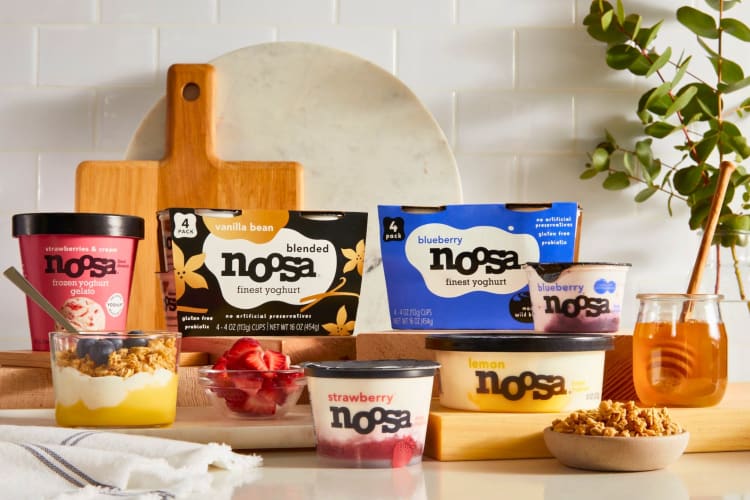
10. Kite Hill
There’s no dearth of plant-based yogurt alternatives in the market today. However, finding a tasty range of affordable products with a lovely texture can be challenging. Brands like Kite Hill are making a name for themselves by offering a variety of high-quality vegan alternatives.
The almond milk yogurt range falls into the league of the best probiotic yogurts for several reasons. Firstly, the yogurt is made with steam-blanched almonds sourced directly from California’s San Joaquin Valley. Secondly, the almond-based yogurts (like all Kite Hill ranges) are free from artificial flavors, colors, sweeteners and preservatives. That said, they are lower in protein than most of the dairy products, so pairing them with nuts, seeds or a higher-protein topping can help round things out.
For those who care, Kite Hill yogurts are Non-GMO Project Verified and certified kosher, signaling careful ingredient sourcing. Almond yogurt can stand in for dairy yogurt in parfaits, curries and baked goods. Keep it refrigerated because it lacks preservatives, and know that heating will inactivate its live cultures, so it’s best stirred in after cooking when you want the probiotic effect.
Kite Hill Plain Almond Milk Yogurt Nutritional Info (per 150-gram serving)
- Calories: 150
- Total Fat: 10 grams (13% DV)
- Saturated Fat: 1 gram (5% DV)
- Sodium: 10 milligrams (0% DV)
- Total Carbs: 12 grams (4% DV)
- Fiber: 2 grams (7% DV)
- Total Sugar: 6 grams
- Added Sugar: 5 grams (10% DV)
- Protein: 4 grams
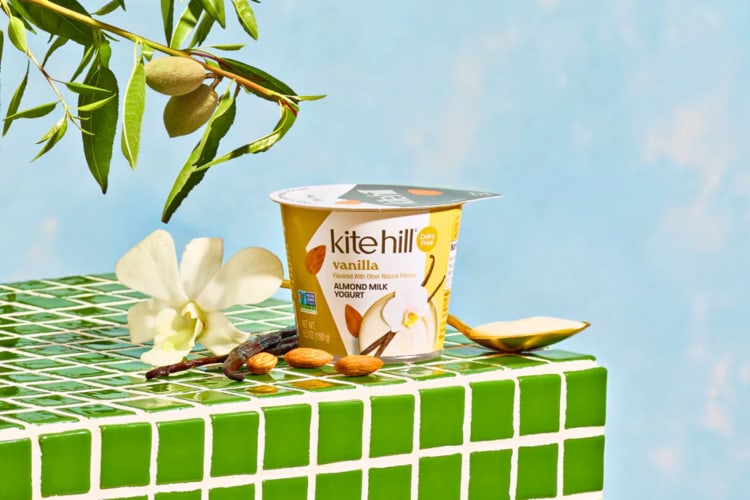
11. GlenOaks Farms Drinkable Yogurts
Many people prefer yogurt in drinkable form when they are on the go, so brands like GlenOaks Farms have created some of the best probiotic yogurts in beverage format.
These drinks supply live cultures such as S. thermophilus, L. bulgaricus, L. lactis and L. acidophilus, with a labeled count of 3.5 billion CFUs per serving at the time of manufacture. They also provide calcium, pea protein and vitamin C from added fruit. Protein is lower than in many spoonable options on this best probiotic yogurts list, so they may be better as a light snack than a primary protein source.
GlenOaks Farms drinkable yogurts come in six fruit flavors, offering variety through the week. The label clearly notes that the drinks are sweetened with liquid sucrose and fruit juice, so anyone watching added sugars will want to keep portions in check.
GlenOaks Strawberry Drinkable Yogurt Nutritional Info (per 180-milliliter serving)
- Calories: 140
- Total Fat: 2.5 grams (3% DV)
- Saturated Fat: 1.5 grams (8% DV)
- Sodium: 75 milligrams (3% DV)
- Total Carbs: 23 grams (8% DV)
- Fiber: 0 grams
- Total Sugar: 17 grams
- Added Sugar: 11 grams (22% DV)
- Protein: 6 grams
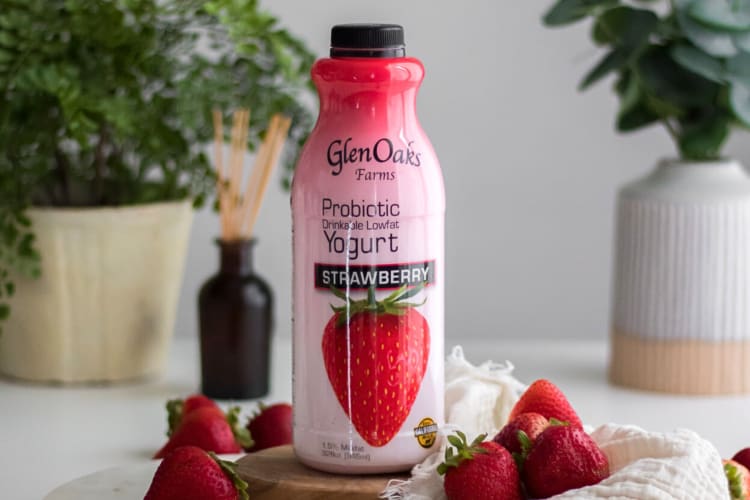
What Is the Best Probiotic Yogurt?
If you are looking for the best probiotic yogurt, you need to check for one that contains live and active cultures and, when disclosed, an adequate CFU count. Let’s break down what this actually means and what you should look for when checking the food labels.
If the label on your yogurt mentions “live and active cultures,” you can also look for specific strains such as Lactobacillus acidophilus, Bifidobacterium and Streptococcus thermophilus. These are common cultures used in yogurt. Some strains have research suggesting they may support digestive comfort and may play a role in immune function, but effects vary by strain, dose and the person eating them. Labels rarely disclose CFUs at the end of shelf life and effective doses vary by strain.
What exactly is the CFU count? It refers to Colony-Forming Units in a probiotic product. A higher CFU count can indicate more live microorganisms at the time of testing, but it does not automatically mean “more benefits.” What tends to matter most for optimal gut health is the specific probiotic strain, its viability through the end of shelf life and how consistently it fits into your routine.
We recommend avoiding yogurts with high amounts of added sugars. Also, attention must be paid to the prebiotic vs. probiotic debate. Both probiotics and prebiotics are helpful for maintaining a healthy gut microbiome. As such, choosing a yogurt that contains both can be a smart strategy for some people, especially if you tolerate added fibers well.
To choose the best probiotic yogurt, you need to weigh in on your overall dietary requirements. If you would like more protein in your daily meal plan, non-fat Greek yogurts (like Fage) stand out for their taste and versatility. If you are looking for an easy add-on to your sweet and savory meals, Chobani, with its minimally added sugars in certain lines, can be a good choice.
Some advocate adding a drinkable yogurt for convenience. However, be aware that most of these options, such as Yakult or GlenOaks Farms, do contain some amount of added sugar, which can add up quickly depending on how often you’re drinking them.

Is Activia the Best Probiotic Yogurt?
There’s no denying that Activia is the first to come to mind when one mentions the best probiotic yogurts, which just proves that the marketing has been spot on. That’s not to say that Activia is not good. Rather, the opposite.
It contains a unique probiotic strain known as Bifidobacterium animalis lactis DN-173 010. Some research on this strain suggests it may help support digestive comfort and may help with stool frequency in certain people, though results can vary and it’s not an instant fix for everyone.
While Activia does contain the sought-after “live and active cultures,” it also comes with added sugars in most of its flavored varieties. So if you’re after one of the best low-sugar yogurts that’s also low in fat and has a beneficial probiotic formula, this may not be the best option for you.
In such cases, we suggest choosing the non-flavored version or looking for a non-fat Greek yogurt instead. That said, Activia remains a popular choice for those whose goal is gut balance and digestive support.
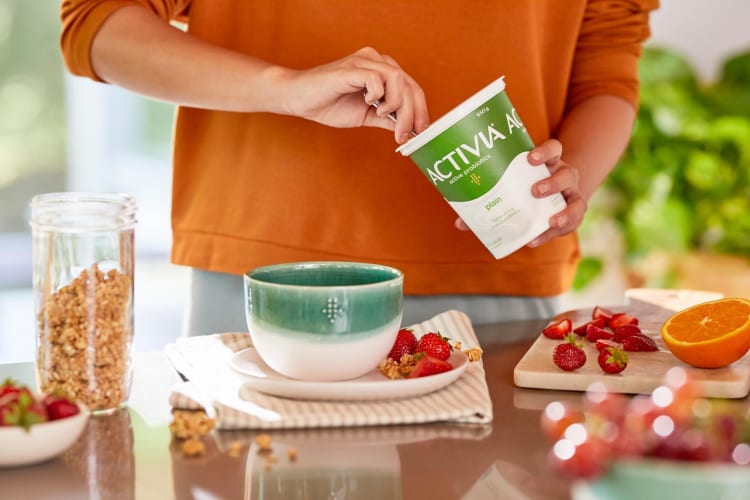
What Is the Best Probiotic Greek Yogurt?
Selecting the best probiotic yogurt need not be complicated. Often enough, choosing a good non-fat/low-fat Greek yogurt ticks most of the boxes required. The best probiotic Greek yogurt is essentially high in protein content, low in added sugar and rich in bacterial benefits. Choosing a non-flavored version of this superfood is your best option, plus it makes for a versatile addition to any sweet or savory recipe.
If we had to choose the healthiest Greek yogurt, Fage and Chobani would be strong contenders for the title. Both brands stand out for their live cultures, minimal added sugars in certain options and an overall balance of protein and fat that can support satisfaction.
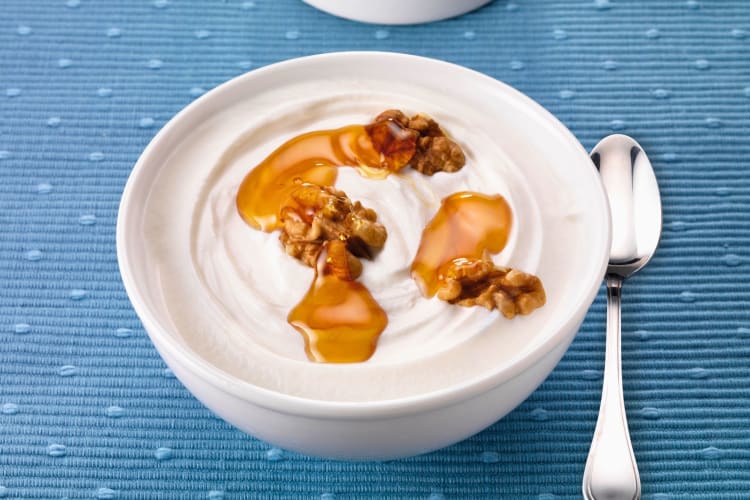
What Is the Best Vegan Probiotic Yogurt?
The question then arises — can one still reap the benefits of the best probiotic yogurts while maintaining a vegan diet? The answer is yes, as today, there are several vegan and plant-based options to suit a variety of dietary demands. If you are seeking a dairy-free alternative, the best probiotic yogurt for you should still contain live active cultures, a high CFU count when disclosed and low to no added sugars.
High on the list of vegan-friendly alternatives is Siggi’s plant-based yogurt range, known for its rich texture and live cultures. Another standout is the Forager Project range, made with cashew milk, though these do come with a higher calorie count.
There are also relatively high-protein vegan alternatives available today, like Kite Hill’s almond milk yogurts. No matter which brand you’re shopping for, though, when buying vegan yogurts, it’s important to check food labels for added sugars and saturated fat so they align with your overall fitness goals, preferences and needs.

How To Tell if a Yogurt Has Probiotics
Reading the labels of other food products might be a straightforward task, but when it comes to yogurts, there are certain terms we suggest you look out for. The U.S. Food and Drug Administration defines yogurt as milk fermented with Lactobacillus bulgaricus and Streptococcus thermophilus, yet some companies heat-treat the product afterward, which kills those cultures and any added probiotics.
So, how can you guarantee you’re getting the best probiotic yogurt during your next shopping trip? Look out for the term “live (and) active cultures” or an “LAC” seal on the label and avoid those that make any mention of them having undergone heat treatment. Sometimes, the labels of these products will also mention their lack of live cultures, making it even easier for you to choose the best probiotic yogurt to take home.
Does All Yogurt Have Probiotics?
One would like to believe that all yogurts contain probiotics, but unfortunately, this is not always true. Yogurt is traditionally made by fermenting milk with bacterial cultures, which can result in live and active probiotic bacteria. For a yogurt to provide probiotic benefits, it must contain these live and active cultures at the time of consumption, which is not guaranteed if it’s been heat-treated after fermentation.
The “Live and Active Cultures” seal from the National Yogurt Association is rare, so on-label wording is your most reliable guide. A strain list or a CFU guarantee at the end of shelf life offers an extra layer of transparency.
When using these best probiotic yogurts in recipes, make sure you gradually warm the yogurt by stirring a few spoonfuls into a hot dish before mixing it all in. This is to reduce curdling. If your goal is to keep live probiotics intact, add yogurt after cooking or use it as a topping, since high heat can reduce the number of live cultures.
When shopping for healthy snacks, look for plain varieties and unflavored options of the best probiotic yogurts as far as possible. Surprisingly, frozen yogurts are not completely devoid of good gut bacteria. Some frozen yogurts contain viable cultures. Again, check the food labels closely, or you might end up enjoying a simple frozen dessert that is not too high on the gut health scale.
Prioritizing gut health and balance is no easy task. Several factors can affect the gut microbiome, such as stress, your daily diet and exercise (or lack of), as well as the use of antibiotics, smoking or drinking and even eating too much ultra-processed foods. A simple way of counteracting these negative factors is by including gut-healthy ingredients in your diet, alongside the basics like enough fiber, adequate sleep and regular movement.
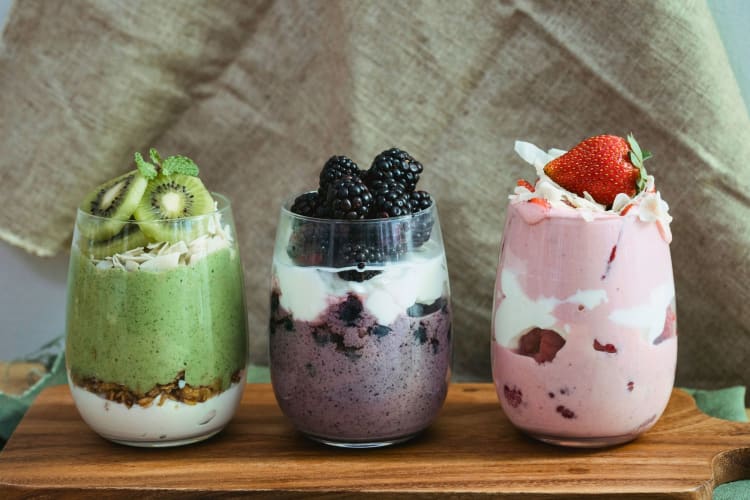
How We Choose the Best Probiotic Yogurts
With more than a decade of experience in the food industry, the Cozymeal team has gained extensive knowledge on numerous brands and products in the culinary space, including the best probiotic yogurts. Sharing this information with our audience has helped us become a trusted source for those seeking advice on what products they should add to their shopping lists and which ones are better left off.
When creating our guides, including this one on the best probiotic yogurts, we aim to only include information that is factually accurate and as comprehensive as possible. To do so, we conducted extensive research that included the views of different experts, including nutritionists. We also took into account the views of our own team members who have tried the best probiotic yogurts.
Additionally, our list of the best probiotic yogurts is based on the following criteria:
- Live and Active Cultures: We came to the conclusion that the best probiotic yogurts are those with probiotic strains clearly listed, often featuring the “Live and Active Cultures” label.
- Health considerations: We selected yogurts with live cultures that may help support digestive health and, in some cases, provide additional nutrients that contribute to overall wellness.
- Ingredients: Where possible, we include yogurts that are made with high-quality ingredients, have minimal additives and are low in added sugars.
- Taste and Texture: We also thought it was reasonable to judge the best probiotic yogurts based on customer reviews of overall enjoyability.
Registered Nutritionist Review
Our final check to ensure we included the best probiotic yogurts was a review done by Jessica O'Shea, a Registered Nutritionist (ANutr) with the Association for Nutrition. Jessica holds a BSc (Hons) in Food, Nutrition and Wellbeing, as well as an MSc in Human Nutrition.
Aside from her education, Jessica is passionate about helping people become the best versions of themselves by making informed choices that are backed by scientific evidence. That’s exactly why she was the right person to scrutinize our list of the best probiotic yogurts and ensure that all the products we included have earned their spot from a nutritional perspective.
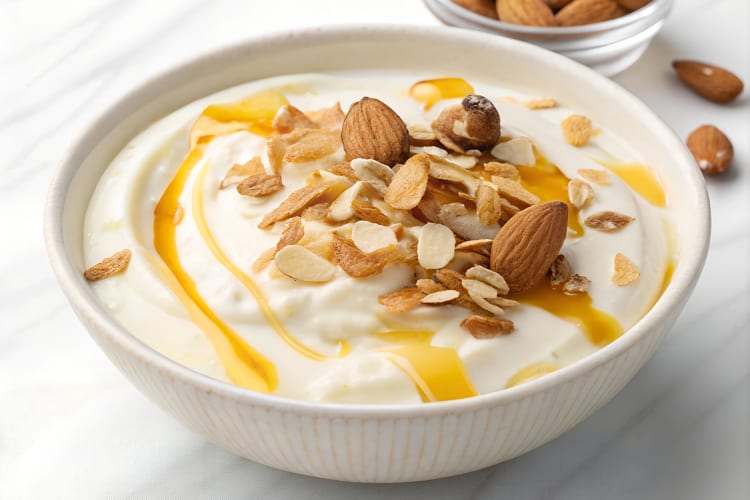
Finding the best probiotic yogurts can play a key role in digestion and overall wellness. But as we have seen, not all yogurts are created equally. Label checking is a must to ensure that the best probiotic yogurts contain live cultures that align with your preferences and goals.
By making an informed choice, you can enjoy a delicious and nutritious addition to your diet that supports overall dietary quality, including your digestive system.
For even more ways to explore your favorite foods, check out other experiences happening on Cozymeal.
